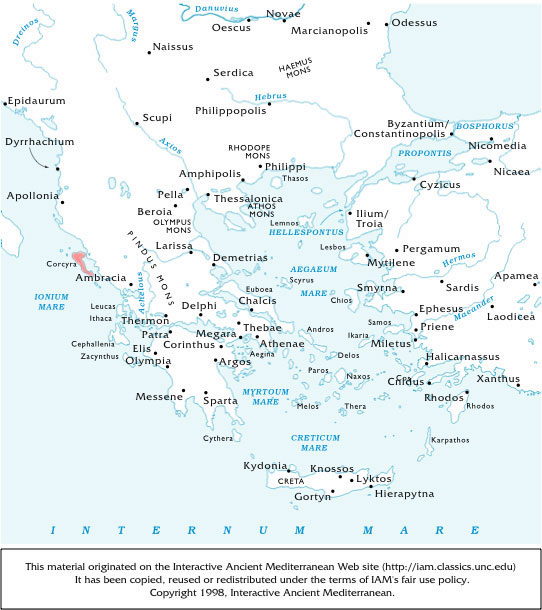An island in the Ionian Sea, off the coast of Epirus, in which Homer is thought to have placed the fabled gardens of Alcinoüs. (See Scheria.) It is said to have been first known under the name of Drepané, perhaps from its similarity of shape to a scythe. To this name succeeded that of Scheria, always used by Homer, and by which it was possibly known in his time. From the Odyssey we learn that this island was then inhabited by Phaeacians, a people who, even at that early period, had acquired considerable skill in nautical affairs and possessed extensive commercial relations, since they traded with the Ph¦nicians, and also with Euboea and other countries (Odyss. vi. vii.).Corcyra was in after-days the principal city of the island, and was situated precisely where the modern town of Corfu stands. Scylax speaks of [p. 410] three harbours, one of which is depicted as beautiful. In the Middle Ages, the citadel obtained the name of Koruphô, from its two conical hills or crests, which appellation was, in process of time, applied to the whole town and finally to the island itself. Hence the modern name of Corfu, which is but a corruption of the former. The following is a sketch of the history of this island. Its earlier periods are enveloped in the mist of uncertainty and conjecture.
A colony of Colchians is said to have settled there about 1349 years before our era. In process of time, Corcyra, enriched and aggrandized by its maritime superiority, became one of the most powerful nations in Greece ( Thuc.i. 1). The Corinthians, under Chersicrates, formed a settlement here in B.C. 753, and 415 years afterwards it was captured by Agathocles of Syracuse, who gave it to his daughter Lanessa upon her marriage with Pyrrhus of Epirus. It was occupied by the troops of the Illyrian queen Teuta, about fifty-eight years after its seizure by Agathocles, but was soon after taken from her by the Romans, under the consul Cn. Flavius; and, although it had the privileges of a free city, it remained under the Romans for many centuries. In the time of Strabo it was reduced to extreme misery. See Schmidt's treatise Korkyräische Studien (Leipzig, 1890). (Harpers Dictionary of Classical Antiquities, 1898)
